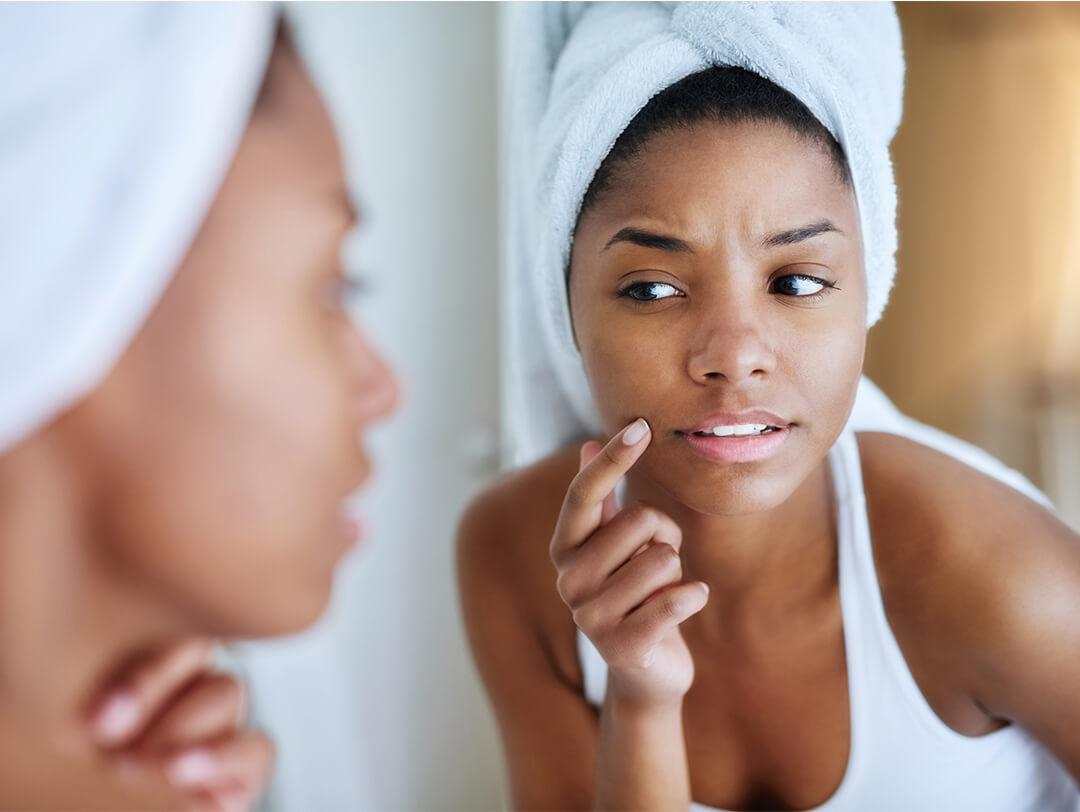Can Aspirin Banish Breakouts for Good? We Asked a Dermatologist



IPSY Editors


Acne is one of the most stubborn and diverse skin conditions out there. An acne treatment that miraculously clears up one person's breakouts may do absolutely nothing to help someone else's blemishes. With so much trial and error, it makes sense that the beauty community has looked high and low for new and inventive ways to get rid of acne. We've tried everything from toothpaste to tea tree oil to yogurt to banish pimples. Now there's another rumored solution making the rounds: crushed aspirin. This acne-fighting home remedy has been whispered throughout the skincare community for years, but has recently gained more attention thanks to a few viral TikTok videos.
If you've been curious about this DIY solution and want an expert's take on the treatment you've come to the right place. Below we're sharing how the medicine is rumored to work and what a board-certified dermatologist thinks about using aspirin for acne.


It's about glam time you treated yourself.
MEET THE EXPERT
Jennifer Herrmann, MD, is an LA-based board-certified dermatologist and dermatologic surgeon.
Why aspirin may help treat acne
The primary reason aspirin is thought to work for acne is because the main active ingredient in the pain reliever is acetylsalicylic acid, an acid that has some structural similarities to salicylic acid, one of the most popular and well-known over-the-counter acne treatments. While the two names may suggest a lot of overlap between these two ingredients, Dermatologist Jennifer Herrmann, MD says they don't really work the same at all.
"Salicylic acid is a beta-hydroxy acid that helps break down oils and loosen old dead skin cells to exfoliate. This helps unclog pores that are blocked in acne," she says. "Aspirin or acetylsalicylic acid is used to treat fever, swelling, and pain. Although it’s broken down into salicylic acid in the gut, the two are not the same before this."
How to use aspirin as a home remedy for acne
The most popular way to use aspirin as a home remedy acne treatment is to finely crush a few aspirin tablets into powder form and mix it with a few drops of water to create a paste. This paste can be used as a spot treatment or applied all over the face as an aspirin mask.
If you test out this DIY acne treatment at home, be sure to use uncoated aspirin tablets as opposed to liquid gels. These contain additives that can irritate the skin if applied topically. If you're using this treatment as a mask, apply it to clean skin and wash it off with warm water after about 10-15 minutes. If you're using it as a spot treatment, you can try leaving it on overnight.
This treatment can be quite drying, and we know that dry skin can actually result in even more breakouts. If you have oily skin, you may be able to keep your moisture barrier intact by simply mixing the crushed aspirin with water, but if you have normal to dry skin, considering combining the crushed aspirin with aloe vera or a hydrating face oil like jojoba oil or squalane oil to protect against dryness while the face mask or spot treatment gets to work.
What types of acne can aspirin treat?
Aspirin is not proven to work on any acne types, but in theory, it may help with cystic or hormonal acne since acetylsalicylic acid's primary purpose is to treat swelling and pain. "Because aspirin is an anti-inflammatory, it may help with some of the skin inflammation in acne," Dr. Herrmann says. "However, we have much better options to decrease swelling and get at the clogging and hormonal triggers in acne."
Potential side effects to aspirin for acne
Like most home remedies and new skincare treatments, skin irritation is the primary concern here. Dr. Herrmman says "Anyone with very sensitive skin may develop irritation with topically applied aspirin. I’d also avoid it in pregnancy." Before testing out an aspirin mask, be sure to do a patch test by applying the mixture to a small area of your face that's easily covered (like under your jawline or the corner of your forehead). Then wait 24 hours to see if you experience any type of redness or irritation.
As mentioned above, you'll also want to keep an eye on how much this treatment dries out your skin. If you're noticing excessive dryness, cut back on the treatment frequency, mix it with a hydrating base (like a face oil or moisturizer), or opt for an alternative treatment that's not quite as harsh.
Not into aspirin for acne? Try these alternative treatments:
When it comes down to it, aspirin isn't exactly an acne treatment Dr. Herrmann would usually recommend. While it may help a bit with swelling, she says, "It’s not at all elegant as a topical on the skin." If you haven't experimented with the following four acne-fighting ingredients, be sure to try incorporating some of them into your skincare routine before testing out more experimental home remedies.
1. Salicylic Acid
Salicylic acid is a gold star ingredient when it comes to at-home acne treatment. As Dr. Herrmann mentioned earlier, the beta-hydroxy acid (BHA) is able to slough away dead skin cells and penetrate pores to clear out congestion.
Try it: GLOW RECIPE Watermelon Glow PHA + BHA Pore-Tight Toner Salicylic acid works great when used as a gentle toner. This clean formula from GLOW RECIPE combines willow bark (where salicylic acid is derived from) with hydrating hyaluronic acid, purifying tea tree oil, and antioxidant-rich watermelon extract. Use it to gently keep pores clear and skin ultra-smooth, soft, and healthy.
2. Benzoyl peroxide
Antibacterial benzoyl peroxide is another top acne-fighting ingredient that can be particularly helpful for inflamed breakouts. While salicylic acid is most helpful at dissolving excess oil and sebum in pores to clear away blackheads and whiteheads, benzoyl peroxide is more useful for inflammatory acne like cystic acne or hormonal acne.
Try it: TULA SKINCARE Go Away Acne Spot Treatment This spot treatment pairs 5 percent benzoyl peroxide with tea tree oil, niacinamide, and azelaic acid to create a powerful yet delicately balanced acne treatment. The formula also includes probiotic extracts to keep the skin's microbiome balanced (no excess dryness here).
3. Retinoids
If you're interested in a powerful acne treatment that also has additional benefits, reach for a retinoid cream or serum. These vitamin A derivatives are clinically proven to treat acne as well as signs of aging thanks to their ability to stimulate collagen growth, speed up cell turnover, and decrease inflammation.
Try it: SUNDAY RILEY A+ High-Dose Retinoid Serum This lotion-like serum combines a retinoid, retinol, and blue-green algae to clear up congestion, improve UV damage, and fight premature signs of aging. For new retinoid users, try incorporating this product into your nightly routine slowly. Use it two days on, two days off, eventually working your way up to every other day, then transitioning into nightly use.
4. Vitamin C
Here's another beloved skincare ingredient that does a little bit of everything. The antioxidant can help to minimize the recurrence of acne, brighten up dark spots, minimize signs of aging and improve radiance overall.
Try it: MY SKINNY MASK Turmeric and Vitamin C Clay Mask This naturally bright yellow mask isn't just fun to snap face mask selfies in, it also provides some amazing benefits for acne-prone skin. While turmeric extract soothes inflammation, aloe vera hydrates, Australian clay absorbs impurities, and vitamin C brightens and treats breakouts. Together it's a holistic, fun, and effective treatment to keep skin glowing and clear.
Want to try out some of the best acne-fighting skincare products? Take our Beauty Quiz now to get started. Already an Ipster? Refer your friends to earn points, which you can use toward products. Either way, don’t forget to check us out on Instagram and Twitter @IPSY.
Like this article? Share it with your friends by clicking the icons below!
Liked this post? Share!
Related Stories


Skin
How to Adjust Your Skincare Routine for Mature Skin in the Winter
Published on Dec 4, 2025 • 7 min read


Skin
Meet the Best Moisturizers for Winter, According to Dermatologists
Published on Dec 1, 2025 • 9 min read


Skin
What Is Inflammaging—and Why Everyone’s Talking About It
Published on Dec 1, 2025 • 8 min read


Skin
6 Skincare Trends to Have on Your Radar in 2026, According to Experts
Published on Dec 1, 2025 • 7 min read


Skin
We Grabbed Our Crystal Ball and Found These 6 Skincare Predictions for 2025
Published on Dec 10, 2024 • 7 min read


Skin
Simple Self-Care Tips That Actually Make a Difference
Published on Nov 13, 2025 • 12 min read


Skin
These 9 Face Scrubs Will Unlock Soft and Smooth Skin on Contact
Published on Nov 5, 2025 • 10 min read


Skin
10 Thanksgiving Foods That Will Have Your Skin Coming Back for Seconds
Published on Oct 15, 2025 • 7 min read


Beauty Picked Just for You
Get 5 products worth up to $70
Plus exclusive access to epic deals up to 80% off
Starting at just $14/month. Cancel anytime.